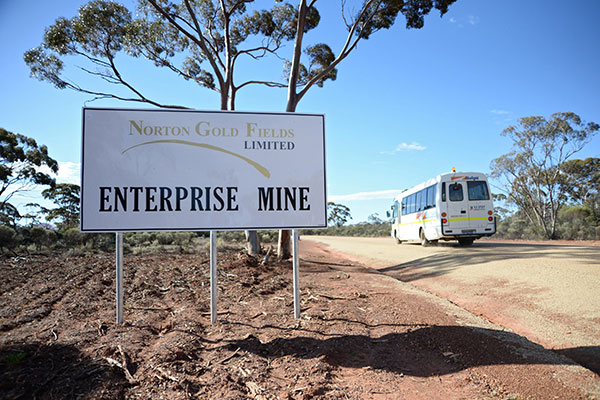|
 |
|
A bus drives past a sign displayed at the entrance to the Norton Gold Fields Ltd, which is northwest of Kalgoorlie, Australia. Norton, the Australian miner, is controlled by China's Zijin Mining Group Co. [Photo/China Daily] |
"In fact, the market value of some exploration companies has been cut by 80 to 90 percent," he added. "This will present new opportunities for Chinese companies to expand their presence in overseas markets."
His views are echoed by colleague Chang Xingguo, project director of international minerals at the finance department with the China Mining Association. Small and medium-sized Australian iron ore mines, he pointed out, are struggling against fierce competition from the industry's major players.
"Industrial giants, such as Rio Tinto Plc, BHP Billiton Ltd and Vale SA, have increased their capacities and supply this year, so many medium-and small-sized Australian mines are facing tough financial times," Chang said.
As the major customer of iron ore, China's heavyweight steel companies have been quick to see opportunities in the market.
Baosteel Group Corp, the country's largest listed steel company, linked up in May with Australian freight operator Aurizon Holdings Ltd to pay about A$1.4 billion ($1.3 billion) for Aquila Resources Ltd. The company had already taken a 20 percent stake in Aquila in 2009 and has increased its investment to 85 percent, with Aurizon owning 15 percent of the Australian miner.
The deal is waiting for regulatory approval.
"Baosteel has been looking to acquire iron ore resources for a long time to meet its demand," Le Yukun, an analyst with BOC International Ltd, Bank of China's investment banking division, in Shanghai, told the industry website mineweb.com.
"Now that prices have dropped, it's time for Baosteel to make acquisitions."
China's Shandong Iron and Steel Group Co Ltd, another industry giant, has also been searching for acquisitions. In April, it bought the remaining 75 percent stake in the Tonkolili Iron Ore mine from African Minerals Ltd in Sierra Leone, West Africa, after acquiring a 25 percent stake for about $1.5 billion in 2011.
"Chinese companies are making the right moves," Wei Zengmin, an analyst at the consultants Mysteel in Shanghai, said. "This is the time they should be acquiring assets even though commodity prices are falling. These are good investments in the long term."
Wei expects this trend to continue even though the acquisition process can take years. "Mining acquisitions involve a complicated process between countries, regulators and financial institutions," he said. "This can take several months or several years. But I expect Chinese companies to continue to look around for overseas acquisitions."
Apart from the iron ore sector, China's copper and gold miners are also expanding their foreign portfolios.
In May, China's Zijin Mining Group bought a 50 percent stake in a Porgera gold mine in Papua New Guinea for $298 million from Barrick Gold, which is based in Canada.
"Our partnership with Zijin is the first step in a long-term relationship with one of China's leading mining companies," John L. Thornton, chairman of Barrick, the largest gold mining company in the world, said in a statement.
"This partnership will provide opportunities to work together as we continue to create value for our respective owners."
At the same time, Zijin also paid $412 million to Ivanhoe Mines, a company based in Canada, for a 49.5 percent stake in Kamoa Holding Ltd, which runs a copper mine in the Democratic Republic of Congo in Central Africa.
